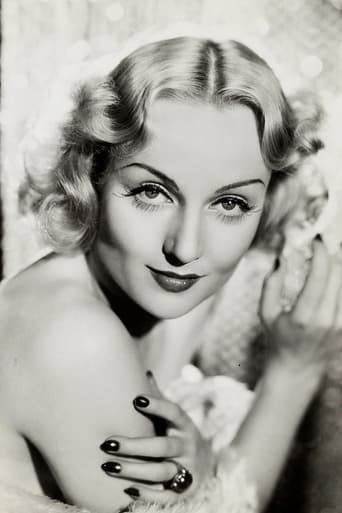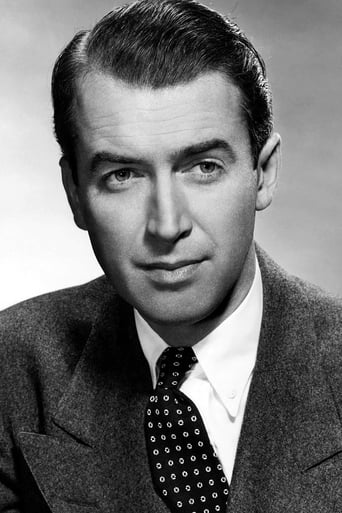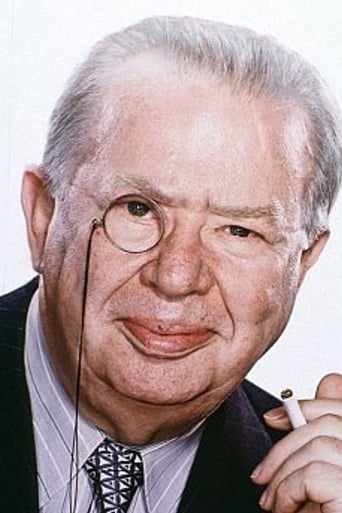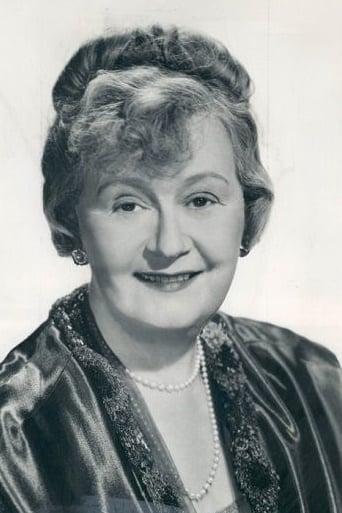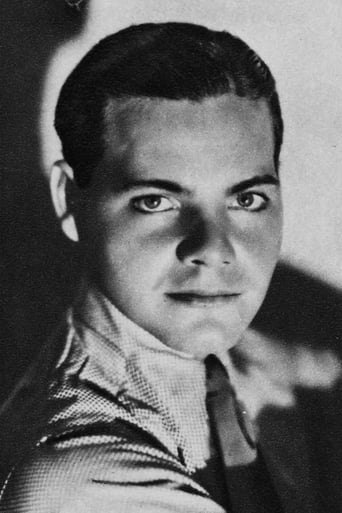Karry
Best movie of this year hands down!
Matialth
Good concept, poorly executed.
Kaydan Christian
A terrific literary drama and character piece that shows how the process of creating art can be seen differently by those doing it and those looking at it from the outside.
Lachlan Coulson
This is a gorgeous movie made by a gorgeous spirit.
disinterested_spectator
The movie begins by announcing that of all the people in New York, John Mason is one of the least important. He works for a law firm, and while on a brief trip to Boston to get a deposition for an upcoming case, Higgins versus Higgins, he met a woman named Jane and married her. It really is amazing, looking back now from the vantage point of the twenty-first century, how unthinkable that would be today. Now, even in 1939, when this movie was made, marrying a woman after having known her only for a few days would have been exceptional. But people did fall in love and get married in those days far more quickly than now. That is not surprising, considering that before the sexual revolution, a lot of people never had sex until they got married, and so couples were often in a hurry to tie the knot.But it is not simply that people could not wait to have sex with each other. Rather, there was a widespread belief at that time that marriages were made in Heaven. This belief is expressed in the title of the movie. So, once you met the person you were made for, there was no reason to hesitate. Today, few people still believe this sort of thing. We fall in love and have sex, not necessarily in that order, and then we fall out of love and break up. We do this a few times with a few different people, and maybe when we find someone we really seem to get along with, we finally decide to get married, usually after living together for a while. And then, as often as not, we end up getting divorced anyway. And thus it is that today we look upon the notion that people are "made for each other" with a jaundiced eye.Their honeymoon is called off when John has to go back to the office, because the continuance he thought he had for Higgins v. Higgins has been rescinded, with the trial scheduled for the next Monday. Shortly after that, we see Jane leaving the doctor's office, having just found out that she is pregnant. She goes to the courtroom, where John is summing up the case of Higgins v. Higgins to tell him the news. So, let's get this straight. John and Jane got married during John's brief visit to Boston. They never even had a honeymoon because of the upcoming trial. And even though the trial is not over, Jane has been pregnant long enough to have made an appointment with the doctor and gotten back the lab results. All I can figure out is that Higgins v. Higgins must have been one long trial.After the baby is born, there follows a lot of helpless-husband and interfering mother-in-law routines that are supposed to be funny. Maybe they were funny in 1939. As I noted above, things were very different in 1939 from the way they are now. And one way in which they are different is in the status of a housewife. For some time now, feminists have bristled over the question often addressed to women, asking them if they work. The implication of such a question, in their opinion, is that housewives do not work. Well, judging by this movie, one has to wonder. From the beginning of their marriage, John and Jane have had a cook.That is breathtaking all by itself. How many people do you know have a full-time cook? And this entire story takes place during the Great Depression, when times were especially hard. But not so hard that they cannot afford a cook, apparently. Anyway, the cook tells Jane that her job is to prepare meals, and that Jane can wash the diapers herself. Jane is devastated. She tells the cook she is fired. Of course, she immediately hires another one, presumably one who will wash the diapers as well as cook the meals (Ew!). In other words, this apartment has two women in it, John's wife and mother, neither of which has a job, and between the two of them, they cannot cook their own meals and wash the diapers. Well maybe housewives today "work," just as the feminists claim, but I am not so sure about the ones in the 1930s, if this movie is any indication.John goes out and gets drunk one night, after finding out he will have to take a cut in pay, coming home at two in the morning. He drops a bottle of milk, waking up the new cook Lily (Louise Beavers). All right, just a cotton-pickin' minute. Now they have a live-in cook? And as we see in the next scene, she is also a nanny, because she is taking care of the baby in the park.Because of the cut in pay, the Mason family starts going into debt, even to the point of having collection agencies being sicced on them. Jane looks for a job, but cannot find one. Finally, she is so desperate, she has to let go of Lily. Now she will have to work in the home, just like a modern housewife. In fact, John gets so depressed that he has turned his wife into a "household drudge" that he decides that they should get a divorce so that she won't be married to a failure. In the course of lamenting their marriage, he even says that maybe they should not have had the baby.Uh-oh! You know what that means. The baby almost dies of an infection. A plane carrying serum to save the baby is lost in a blizzard. A nurse tells Jane there is one more thing she can do. She leads her to the chapel, where Jane prays to Jesus. I would have given anything for that scene to be followed by one in which we see the plane crash into the side of a mountain.
GAWeldon
Your enjoyment of "Made For Each Other" is entirely dependent on your appreciation for Jimmy Stewart. If you're a big fan of his, you should find this movie mildly entertaining. If, however, you find Jimmy Stewart vastly overrated as an actor, like I do, then you're in for a painful slog.All of Stewart's quirks, gimmicks, affectations, and stammers are fully on view here. In this movie, he plays a wimpy lawyer who lets everyone and everything in his life overwhelm him. That would be fine if the movie gave us any kind of story to attach to the character he plays. It doesn't. There's a co-worker at the law firm where Stewart works who seems to be the film's villain early on. They're competing for a firm partnership, so it seems like we might get some heated office politics. We don't. Stewart had been dating the boss' daughter before meeting his wife, so it seems like we might get some interesting romantic rivalry sparks in the movie. We don't. Stewart's boss (Charles Coburn) pushes Stewart around, possibly because Stewart ditched his daughter, so we might get some "boss vs. employee" friction. We don't. Stewart's new wife and his mom rub each other the wrong way, so we might get some interesting family in-fighting. We don't. In fact, not much really happens in this movie at all.After about an hour of listlessness, Stewart and Lombard decide to get a divorce. At this point, I thought, "Well, maybe their baby will get sick and die and that'll end this dreary movie." Shazam! The next scene, that very thing started to happen! All of a sudden Stewart is sobbing on the phone, demanding help from his boss, praying for help, all in the most melodramatic way possible. Some random pilot decides to fly from Salt Lake City to New York during a raging blizzard (in an open air bi-plane!!!) in order to save the day. Why couldn't the movie be about THAT guy? Stewart's character is such a mama's boy that its hard to root for him at all. I could never see what Lombard's character saw in him in the first place. Charles Coburn's character started off as really irritating, with the old "hard-of-hearing" schtick that seems to be prevalent in so many old movies. He really takes control of the situation (and the movie) by becoming a man of action once the baby gets sick. His role became the most interesting part of the movie at that point.If you want to see Jimmy Stewart at his best (in 1939), stick with "Mr. Smith Goes to Washington".
edwagreen
Terrific comedy which soon falls into dramatic overtones with Jimmy Stewart, Carole Lombard and Lucille Watson providing great acting.Stewart marries Lombard after meeting her during a business trip. He brings her home and she is immediately disliked by mother-in-law Watson. Watson takes the role of the find-fault mother-in-law with relish and in comedy never lets Stewart forget that he could have married Charles Coburn's (the boss) daughter.The young couple can't seem to make it. When Stewart asks Coburn for a raise, Coburn beats him to it and tells that with hard times, everyone must take a 25% pay deduction. When the baby comes, everything seems to go downhill.Now, the picture takes on dramatic overtones with a new year's bout between Lombard and Watson. It looks like this marriage is going, going gone.With the baby's sudden illness, we see how people can come together in times of distress. The cooperating boss, the pilot flying the serum, the understanding maid, quite a difference from nasty Alma Kruger, who quit during a dinner party, and the couple that called the hospital when they came upon the collapsed pilot holding the serum. This sequence basically shows what America is all about.
secondtake
Made for Each Other (1939)"Last year there were half a million divorces in this country. Congratulations."And that is the beginning of a sometimes-screwball comedy that turns very serious by the end, with James Stewart leading the charge. It could be screwier, and Jimmy Stewart is more lovable than hilarious, so the humor revolves around him as the foil. Carole Lombard, his partner in crime, can be more zany, for sure, but even there, she is more restrained than other films (like "Twentieth Century"). It's the situation, and the rest of the cast, who make this funny...and eventually tragic.How exactly it drags at times is hard to say. Oddly, even Stewart is a little off base, exaggerating too much. The plot, overall, lacks drive. You might think this doesn't matter in a silly comedy, but it does very much. In fact, because this comedy is laced with a fair amount of normal drama, it needs a basic conflict that dramas need. There are some terrific scenes--the New Year's moment is really moving, and the scenes after that--and these are the reason to watch.On some level, this is a type of drama/comedy that is aimed at new parents, or newlyweds. The couple's focus on the baby reminded me of "Christmas in Connecticut," and "Penny Serenade." I wish it just worked better, but too often it bumbles along, one little moment after another, the result of imperfect direction (John Cromwell) and a weak script. So it does the best it can, and the last half hour is its best, with high drama kicking in. This is a David O. Selznick production in the same year as his slightly more famous movie, "Gone with the Wind."


